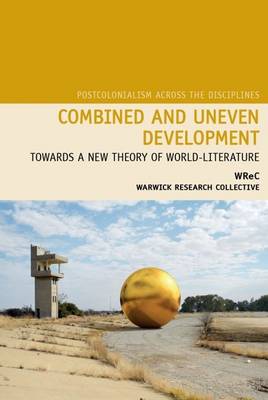
Stock image for illustration purposes only - book cover, edition or condition may vary.
Combined and Uneven Development: Towards a New Theory of World-Literature (Postcolonialism Across the Disciplines LUP)
Sharae Deckard
€ 42.64
FREE Delivery in Ireland
Description for Combined and Uneven Development: Towards a New Theory of World-Literature (Postcolonialism Across the Disciplines LUP)
Paperback. Aims to resituate the problem of 'world literature', considered as a revived category of theoretical enquiry, by pursuing the literary-cultural implications of the theory of combined and uneven development. Series: Postcolonialism Across the Disciplines. Num Pages: 256 pages. BIC Classification: DSBH5. Category: (P) Professional & Vocational. Dimension: 235 x 158 x 17. Weight in Grams: 322.
The ambition of this book is to resituate the problem of `world literature', considered as a revived category of theoretical enquiry, by pursuing the literary-cultural implications of the theory of combined and uneven development. This theory has a long pedigree in the social sciences, where it continues to stimulate debate. But its implications for cultural analysis have received less attention, even though the theory might be said to draw attention to a central - perhaps the central - arc or trajectory of modern(ist) production in literature and the other arts worldwide. It is in the conjuncture of combined and uneven development, on the one hand, and the recently interrogated and expanded categories of `world literature' and `modernism', on the other, that this book looks for its specific contours. In the two theoretical chapters that frame the book, the authors argue for a single, but radically uneven world-system; a singular modernity, combined and uneven; and a literature that variously registers this combined unevenness in both its form and content to reveal itself as, properly speaking, world-literature. In the four substantive chapters that then follow, the authors explore a selection of modern-era fictions in which the potential of their method of comparativism seems to be most dramatically highlighted. They treat the novel paradigmatically, not exemplarily, as a literary form in which combined and uneven development is manifested with particular salience, due in no small part to its fundamental association with the rise of capitalism and its status in peripheral and semi-peripheral societies as a `modernising' import. The peculiar plasticity and hybridity of the novel form enables it to incorporate not only multiple literary levels, genres and modes, but also other non-literary and archaic cultural forms - so that, for example, realist elements might be mixed with more experimental modes of narration, or older literary devices might be reactivated in juxtaposition with more contemporary frames.
Product Details
Publisher
Liverpool University Press
Format
Paperback
Publication date
2015
Series
Postcolonialism Across the Disciplines
Condition
New
Weight
322g
Number of Pages
256
Place of Publication
Liverpool, United Kingdom
ISBN
9781781381915
SKU
V9781781381915
Shipping Time
Usually ships in 7 to 11 working days
Ref
99-50
About Sharae Deckard
Sharae Deckard, Nicholas Lawrence, Neil Lazarus, Graeme Macdonald, Upamanyu Pablo Mukherjee, Benita Parry and Stephen Shapiro are all members of the Warwick Research Collective (WReC) at the University of Warwick. Pablo Mukherjee is Professor of English and Comparative Literary Studies at the University of Warwick.
Reviews for Combined and Uneven Development: Towards a New Theory of World-Literature (Postcolonialism Across the Disciplines LUP)
'Overall, Combined and Uneven Development not only offers a much-needed theorisation of how literature is shaped by the `world', but also how it can reimagine different political, historical, and social contexts. Through a number of compelling case studies from a range of geopolitical contexts the WReC exemplify how their theory of world-literature can be discerned and developed in peripheral and semi-peripheral literary spaces.' Isabelle Hesse, The University of Sydney, Postcolonial Studies Association 'Theoretically, they emphasise that literature is a globally connected system, in which one can differentiate between core cultures and peripheries.... For world-literature understood in this sense, the authors elaborate a valuable and undeniably useful toolkit of literary analysis.' Peter Hajdu, Recherche Litteraire / Literary Research 'I would recommend the book as an introductory piece that can double as an entree into the WReC's other projects, all of which are well worth the read.' Matthew Eatough, Postcolonial Text 'This book marks a new path. From its opening to its concluding lines, it is analytically precise, uncannily well-read, forthright without being blunt, and as comprehensive as any study of world literature is ever likely to be. The book promises a new comparatism and it very much delivers: eloquently, intelligently, and with a distinctive command.' Timothy Brennan, University of Minnesota 'Hinging on the powerful explanatory value of the concept of combined and uneven development, this well-conceived and carefully researched collective effort makes a strong case for its own, highly developed 'world-systems' approach to the `world' in `world literature' while at the same time situating itself critically but patiently within the welter of rubrics and jargons that have made any scholarly venture into postcolonial and/or world literary territories a parlous one simply because of the danger of getting bogged down in endlessly sectarian disputes over the purported politics implied in the adoption of this or that self-designation.' Neil Larsen Reviews 'This book marks a new path. From its opening to its concluding lines, it is analytically precise, uncannily well-read, forthright without being blunt, and as comprehensive as any study of world literature is ever likely to be. The book promises a new comparatism and it very much delivers: eloquently, intelligently, and with a distinctive command.' Timothy Brennan, University of Minnesota
